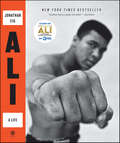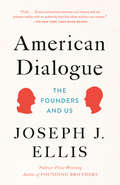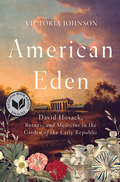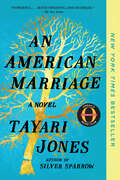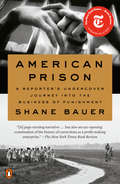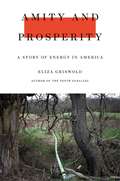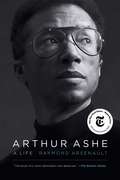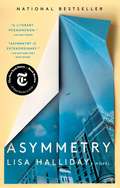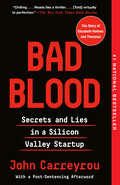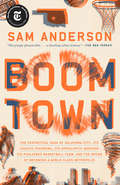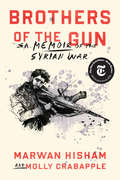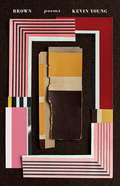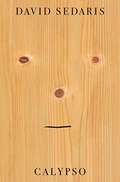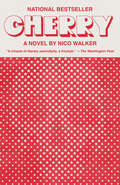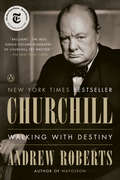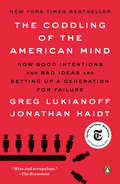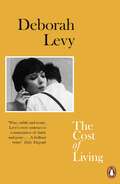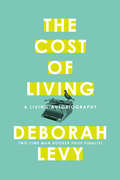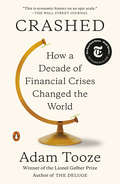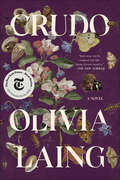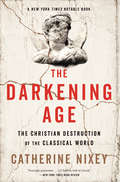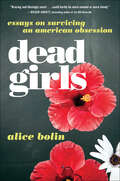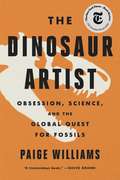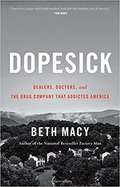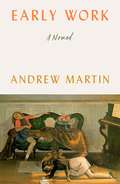Special Collections
100 Notable Books of 2018
- Table View
- List View
Ali
by Jonathan EigNEW YORK TIMES BESTSELLER | Winner of the 2018 PEN/ESPN Award for Literary Sports Writing | Winner of The Times Sports Biography of the Year | The definitive biography of an American icon, from a best-selling author with unique access to Ali’s inner circle. “As Muhammad Ali’s life was an epic of a life so Ali: A Life is an epic of a biography . . . for pages in succession its narrative reads like a novel––a suspenseful novel with a cast of vivid characters.” –– Joyce Carol Oates, New York Times Book ReviewMuhammad Ali was born Cassius Clay in racially segregated Louisville, Kentucky, the son of a sign painter and a housekeeper. He went on to become a heavyweight boxer with a dazzling mix of power and speed, a warrior for racial pride, a comedian, a preacher, a poet, a draft resister, an actor, and a lover. Millions hated him when he changed his religion, changed his name, and refused to fight in the Vietnam War. He fought his way back, winning hearts, but at great cost.Jonathan Eig, hailed by Ken Burns as one of America’s master storytellers, sheds important new light on Ali’s politics, religion, personal life, and neurological condition through unprecedented access to all the key people in Ali’s life, more than 500 interviews and thousands of pages of previously unreleased FBI and Justice Department files and audiotaped interviews from the 1960s. Ali: A Life is a story about America, about race, about a brutal sport, and about a courageous man who shook up the world.
American Dialogue
by Joseph J. EllisThe award-winning author of Founding Brothers and The Quartet now gives us a deeply insightful examination of the relevance of the views of George Washington, Thomas Jefferson, James Madison, and John Adams to some of the most divisive issues in America today.
The story of history is a ceaseless conversation between past and present, and in American Dialogue Joseph J. Ellis focuses the conversation on the often-asked question "What would the Founding Fathers think?" He examines four of our most seminal historical figures through the prism of particular topics, using the perspective of the present to shed light on their views and, in turn, to make clear how their now centuries-old ideas illuminate the disturbing impasse of today's political conflicts. He discusses Jefferson and the issue of racism, Adams and the specter of economic inequality, Washington and American imperialism, Madison and the doctrine of original intent. Through these juxtapositions--and in his hallmark dramatic and compelling narrative voice--Ellis illuminates the obstacles and pitfalls paralyzing contemporary discussions of these fundamentally important issues.
American Eden
by Victoria JohnsonThe untold story of Hamilton’s—and Burr’s—personal physician, whose dream to build America’s first botanical garden inspired the young Republic.
On a clear morning in July 1804, Alexander Hamilton stepped onto a boat at the edge of the Hudson River. He was bound for a New Jersey dueling ground to settle his bitter dispute with Aaron Burr. Hamilton took just two men with him: his “second” for the duel, and Dr. David Hosack.
As historian Victoria Johnson reveals in her groundbreaking biography, Hosack was one of the few points the duelists did agree on. Summoned that morning because of his role as the beloved Hamilton family doctor, he was also a close friend of Burr. A brilliant surgeon and a world-class botanist, Hosack—who until now has been lost in the fog of history—was a pioneering thinker who shaped a young nation.
Born in New York City, he was educated in Europe and returned to America inspired by his newfound knowledge. He assembled a plant collection so spectacular and diverse that it amazes botanists today, conducted some of the first pharmaceutical research in the United States, and introduced new surgeries to American. His tireless work championing public health and science earned him national fame and praise from the likes of Thomas Jefferson, James Madison, Alexander von Humboldt, and the Marquis de Lafayette.
One goal drove Hosack above all others: to build the Republic’s first botanical garden. Despite innumerable obstacles and near-constant resistance, Hosack triumphed when, by 1810, his Elgin Botanic Garden at last crowned twenty acres of Manhattan farmland. “Where others saw real estate and power, Hosack saw the landscape as a pharmacopoeia able to bring medicine into the modern age” (Eric W. Sanderson, author of Mannahatta). Today what remains of America’s first botanical garden lies in the heart of midtown, buried beneath Rockefeller Center.
Whether collecting specimens along the banks of the Hudson River, lecturing before a class of rapt medical students, or breaking the fever of a young Philip Hamilton, David Hosack was an American visionary who has been too long forgotten. Alongside other towering figures of the post-Revolutionary generation, he took the reins of a nation. In unearthing the dramatic story of his life, Johnson offers a lush depiction of the man who gave a new voice to the powers and perils of nature.
An American Marriage (Oprah's Book Club)
by Tayari JonesA NEW YORK TIMES AND WASHINGTON POST NOTABLE BOOK A 2018 BEST OF THE YEAR SELECTION OF NPR * TIME * BUSTLE * O, THE OPRAH MAGAZINE * THE DALLAS MORNING NEWS * AMAZON.COM OPRAH&’S BOOK CLUB 2018 SELECTION LONGLISTED FOR THE 2018 NATIONAL BOOK AWARD FOR FICTION&“A moving portrayal of the effects of a wrongful conviction on a young African-American couple.&” —Barack Obama &“Haunting . . . Beautifully written.&” —The New York Times Book Review &“Brilliant and heartbreaking . . . Unforgettable.&” —USA Today &“A tense and timely love story . . . Packed with brave questions about race and class.&” —People &“Compelling.&” —The Washington Post &“Epic . . . Transcendent . . . Triumphant.&” —Elle Newlyweds Celestial and Roy are the embodiment of both the American Dream and the New South. He is a young executive, and she is an artist on the brink of an exciting career. But as they settle into the routine of their life together, they are ripped apart by circumstances neither could have imagined. Roy is arrested and sentenced to twelve years for a crime Celestial knows he didn&’t commit. Though fiercely independent, Celestial finds herself bereft and unmoored, taking comfort in Andre, her childhood friend, and best man at their wedding. As Roy&’s time in prison passes, she is unable to hold on to the love that has been her center. After five years, Roy&’s conviction is suddenly overturned, and he returns to Atlanta ready to resume their life together. This stirring love story is a profoundly insightful look into the hearts and minds of three people who are at once bound and separated by forces beyond their control. An American Marriage is a masterpiece of storytelling, an intimate look deep into the souls of people who must reckon with the past while moving forward—with hope and pain—into the future.
American Prison
by Shane BauerA ground-breaking and brave inside reckoning with the nexus of prison and profit in America: in one Louisiana prison and over the course of our country's history.
In 2014, Shane Bauer was hired for $9 an hour to work as an entry-level prison guard at a private prison in Winnfield, Louisiana. An award-winning investigative journalist, he used his real name; there was no meaningful background check. Four months later, his employment came to an abrupt end. But he had seen enough, and in short order he wrote an exposé about his experiences that won a National Magazine Award and became the most-read feature in the history of the magazine Mother Jones. Still, there was much more that he needed to say.
In American Prison, Bauer weaves a much deeper reckoning with his experiences together with a thoroughly researched history of for-profit prisons in America from their origins in the decades before the Civil War. For, as he soon realized, we can't understand the cruelty of our current system and its place in the larger story of mass incarceration without understanding where it came from. Private prisons became entrenched in the South as part of a systemic effort to keep the African-American labor force in place in the aftermath of slavery, and the echoes of these shameful origins are with us still.
The private prison system is deliberately unaccountable to public scrutiny. Private prisons are not incentivized to tend to the health of their inmates, or to feed them well, or to attract and retain a highly-trained prison staff. Though Bauer befriends some of his colleagues and sympathizes with their plight, the chronic dysfunction of their lives only adds to the prison's sense of chaos. To his horror, Bauer finds himself becoming crueler and more aggressive the longer he works in the prison, and he is far from alone.
A blistering indictment of the private prison system, and the powerful forces that drive it, American Prison is a necessary human document about the true face of justice in America.
Amity and Prosperity
by Eliza GriswoldIn Amity and Prosperity, the prizewinning poet and journalist Eliza Griswold tells the story of the energy boom’s impact on a small town at the edge of Appalachia and one woman’s transformation from a struggling single parent to an unlikely activist.
Stacey Haney is a local nurse working hard to raise two kids and keep up her small farm when the fracking boom comes to her hometown of Amity, Pennsylvania. Intrigued by reports of lucrative natural gas leases in her neighbors’ mailboxes, she strikes a deal with a Texas-based energy company. Soon trucks begin rumbling past her small farm, a fenced-off drill site rises on an adjacent hilltop, and domestic animals and pets start to die. When mysterious sicknesses begin to afflict her children, she appeals to the company for help. Its representatives insist that nothing is wrong.
Alarmed by her children’s illnesses, Haney joins with neighbors and a committed husband-and-wife legal team to investigate what’s really in the water and air. Against local opposition, Haney and her allies doggedly pursue their case in court and begin to expose the damage that’s being done to the land her family has lived on for centuries. Soon a community that has long been suspicious of outsiders faces wrenching new questions about who is responsible for their fate, and for redressing it: The faceless corporations that are poisoning the land? The environmentalists who fail to see their economic distress? A federal government that is mandated to protect but fails on the job? Drawing on seven years of immersive reporting, Griswold reveals what happens when an imperiled town faces a crisis of values, and a family wagers everything on an improbable quest for justice.
Arthur Ashe
by Raymond ArsenaultThe first comprehensive, authoritative biography of American icon Arthur Ashe—the Jackie Robinson of men’s tennis—a pioneering athlete who, after breaking the color barrier, went on to become an influential civil rights activist and public intellectual.
Born in Richmond, Virginia, in 1943, by the age of eleven, Arthur Ashe was one of the state's most talented black tennis players. Jim Crow restrictions barred Ashe from competing with whites. Still, in 1960 he won the National Junior Indoor singles title, which led to a tennis scholarship at UCLA. He became the first African American to play for the US Davis Cup team in 1963, and two years later he won the NCAA singles championship. In 1968, he won both the US Amateur title and the first US Open title, rising to a number one national ranking. Turning professional in 1969, he soon became one of the world’s most successful tennis stars, winning the Australian Open in 1970 and Wimbledon in 1975. After retiring in 1980, he served four years as the US Davis Cup captain and was inducted into the International Tennis Hall of Fame in 1985.
In this revelatory biography, Raymond Arsenault chronicles Ashe’s rise to stardom on the court. But much of the book explores his off-court career as a human rights activist, philanthropist, broadcaster, writer, businessman, and celebrity. In the 1970s and 1980s, Ashe gained renown as an advocate for sportsmanship, education, racial equality, and the elimination of apartheid in South Africa. But from 1979 on, he was forced to deal with a serious heart condition that led to multiple surgeries and blood transfusions, one of which left him HIV-positive.
In 1988, after completing a three-volume history of African-American athletes, he was diagnosed with AIDS, a condition he revealed only four years later. After devoting the last ten months of his life to AIDS activism, he died in February 1993 at the age of forty-nine, leaving an inspiring legacy of dignity, integrity, and active citizenship.
Based on prodigious research, including more than one hundred interviews, Raymond Arsenault’s insightful and compelling biography puts Ashe in the context of both his time and the long struggle of African-American athletes seeking equal opportunity and respect.
Asymmetry
by Lisa HallidayTold in three distinct and uniquely compelling sections, Asymmetry explores the imbalances that spark and sustain many of our most dramatic human relations: inequities in age, power, talent, wealth, fame, geography, and justice. The first section, “Folly,” tells the story of Alice, a young American editor, and her relationship with the famous and much older writer Ezra Blazer. A tender and exquisite account of an unexpected romance that takes place in New York during the early years of the Iraq War, “Folly” also suggests an aspiring novelist’s coming-of-age. By contrast, “Madness” is narrated by Amar, an Iraqi-American man who, on his way to visit his brother in Kurdistan, is detained by immigration officers and spends the last weekend of 2008 in a holding room in Heathrow. These two seemingly disparate stories gain resonance as their perspectives interact and overlap, with yet new implications for their relationship revealed in an unexpected coda.
Bad Blood
by John CarreyrouThe full inside story of the breathtaking rise and shocking collapse of Theranos, the multibillion-dollar biotech startup, by the prize-winning journalist who first broke the story and pursued it to the end, despite pressure from its charismatic CEO and threats by her lawyers.
In 2014, Theranos founder and CEO Elizabeth Holmes was widely seen as the female Steve Jobs: a brilliant Stanford dropout whose startup "unicorn" promised to revolutionize the medical industry with a machine that would make blood testing significantly faster and easier.
Backed by investors such as Larry Ellison and Tim Draper, Theranos sold shares in a fundraising round that valued the company at more than $9 billion, putting Holmes's worth at an estimated $4.7 billion.
There was just one problem: The technology didn't work.
A riveting story of the biggest corporate fraud since Enron, a tale of ambition and hubris set amid the bold promises of Silicon Valley.
A New York Times Bestseller
Boom Town
by Sam AndersonAward-winning journalist Sam Anderson’s long-awaited debut is a brilliant, kaleidoscopic narrative of Oklahoma City--a great American story of civics, basketball, and destiny.
Oklahoma City was born from chaos. It was founded in a bizarre but momentous "Land Run" in 1889, when thousands of people lined up along the borders of Oklahoma Territory and rushed in at noon to stake their claims.
Since then, it has been a city torn between the wild energy that drives its outsized ambitions, and the forces of order that seek sustainable progress.
Nowhere was this dynamic better realized than in the drama of the Oklahoma City Thunder basketball team’s 2012-13 season, when the Thunder’s brilliant general manager, Sam Presti, ignited a firestorm by trading future superstar James Harden just days before the first game. Presti’s all-in gamble on “the Process”—the patient, methodical management style that dictated the trade as the team’s best hope for long-term greatness—kicked off a pivotal year in the city’s history, one that would include pitched battles over urban planning, a series of cataclysmic tornadoes, and the frenzied hope that an NBA championship might finally deliver the glory of which the city had always dreamed.
Boom Town announces the arrival of an exciting literary voice. Sam Anderson, former book critic for New York magazine and now a staff writer at the New York Times magazine, unfolds an idiosyncratic mix of American history, sports reporting, urban studies, gonzo memoir, and much more to tell the strange but compelling story of an American city whose unique mix of geography and history make it a fascinating microcosm of the democratic experiment.
Filled with characters ranging from NBA superstars Kevin Durant and Russell Westbrook; to Flaming Lips oddball frontman Wayne Coyne; to legendary Great Plains meteorologist Gary England; to Stanley Draper, Oklahoma City's would-be Robert Moses; to civil rights activist Clara Luper; to the citizens and public servants who survived the notorious 1995 bombing of the Alfred P. Murrah federal building, Boom Town offers a remarkable look at the urban tapestry woven from control and chaos, sports and civics.
Brothers of the Gun
by Molly Crabapple and Marwan HishamA bracingly immediate memoir by a young man coming of age during the Syrian war, Brothers of the Gun is an intimate lens on the century’s bloodiest conflict and a profound meditation on kinship, home, and freedom.
In 2011, Marwan Hisham and his two friends—fellow working-class college students Nael and Tareq—joined the first protests of the Arab Spring in Syria, in response to a recent massacre. Arm-in-arm they marched, poured Coca-Cola into one another’s eyes to blunt the effects of tear gas, ran from the security forces, and cursed the country’s president, Bashar al-Assad. It was ecstasy. A long-bottled revolution was finally erupting, and freedom from a brutal dictator seemed, at last, imminent. Five years later, the three young friends were scattered: one now an Islamist revolutionary, another dead at the hands of government soldiers, and the last, Marwan, now a journalist in Turkish exile, trying to find a way back to a homeland reduced to rubble.
Marwan was there to witness and document firsthand the Syrian war, from its inception to the present. He watched from the rooftops as regime warplanes bombed soldiers; as revolutionary activist groups, for a few dreamy days, spray-painted hope on Raqqa; as his friends died or threw in their lot with Islamist fighters. He became a journalist by courageously tweeting out news from a city under siege by ISIS, the Russians, and the Americans all at once. He saw the country that ran through his veins—the country that held his hopes, dreams, and fears—be destroyed in front of him, and eventually joined the relentless stream of refugees risking their lives to escape.
Illustrated with more than eighty ink drawings by Molly Crabapple that bring to life the beauty and chaos, Brothers of the Gun offers a ground-level reflection on the Syrian revolution—and how it bled into international catastrophe and global war. This is a story of pragmatism and idealism, impossible violence and repression, and, even in the midst of war, profound acts of courage, creativity, and hope.
Brown
by Kevin YoungJames Brown. John Brown's raid. Brown v. the Topeka Board of Ed. The prize-winning author of Blue Laws meditates on all things "brown" in this powerful new collection.
Divided into "Home Recordings" and "Field Recordings," Brown speaks to the way personal experience is shaped by culture, while culture is forever affected by the personal, recalling a black Kansas boyhood to comment on our times. From "History"--a song of Kansas high-school fixture Mr. W., who gave his students "the Sixties / minus Malcolm X, or Watts, / barely a march on Washington"--to "Money Road," a sobering pilgrimage to the site of Emmett Till's lynching, the poems engage place and the past and their intertwined power.
These thirty-two taut poems and poetic sequences, including an oratorio based on Mississippi "barkeep, activist, waiter" Booker Wright that was performed at Carnegie Hall and the vibrant sonnet cycle "De La Soul Is Dead," about the days when hip-hop was growing up ("we were black then, not yet / African American"), remind us that blackness and brownness tell an ongoing story. A testament to Young's own--and our collective--experience, Brown offers beautiful, sustained harmonies from a poet whose wisdom deepens with time.
Calypso
by David SedarisDavid Sedaris returns with his most deeply personal and darkly hilarious book.
If you've ever laughed your way through David Sedaris's cheerfully misanthropic stories, you might think you know what you're getting with Calypso. You'd be wrong.
When he buys a beach house on the Carolina coast, Sedaris envisions long, relaxing vacations spent playing board games and lounging in the sun with those he loves most. And life at the Sea Section, as he names the vacation home, is exactly as idyllic as he imagined, except for one tiny, vexing realization: it's impossible to take a vacation from yourself.
With Calypso, Sedaris sets his formidable powers of observation toward middle age and mortality. Make no mistake: these stories are very, very funny--it's a book that can make you laugh 'til you snort, the way only family can.
Sedaris's powers of observation have never been sharper, and his ability to shock readers into laughter unparalleled. But much of the comedy here is born out of that vertiginous moment when your own body betrays you and you realize that the story of your life is made up of more past than future.
This is beach reading for people who detest beaches, required reading for those who loathe small talk and love a good tumor joke. Calypso is simultaneously Sedaris's darkest and warmest book yet--and it just might be his very best.
A New York Times Bestseller
Cherry
by Nico WalkerJesus' Son meets Reservoir Dogs in a breakneck-paced debut novel about love, war, bank robberies, and heroin.Cleveland, 2003. A young man is just a college freshman when he meets Emily. They share a passion for Edward Albee and Ecstasy and fall hard and fast in love. But soon Emily has to move home to Elba, New York and he flunks out of school and joins the Army.
Desperate to keep their relationship alive, they marry before he ships out to Iraq. But as an Army medic, he is unprepared for the grisly reality that awaits him. His fellow soldiers smoke; they huff computer duster; they take painkillers; they watch porn. And many of them die. He and Emily try to make their long-distance marriage work, but when he returns from Iraq, his PTSD is profound, and the drugs on the street have changed. The opioid crisis is beginning to swallow up the Midwest.
Soon he is hooked on heroin, and so is Emily. They attempt a normal life, but with their money drying up, he turns to the one thing he thinks he could be really good at--robbing banks.Hammered out on a typewriter, Cherry marks the arrival of a raw, bleakly hilarious, and surprisingly poignant voice straight from the dark heart of America.
A New York Times Bestseller
Churchill
by Andrew RobertsIn this landmark biography of Winston Churchill based on extensive new material, the true genius of the man, statesman and leader can finally be fully seen and understood--by the bestselling, award-winning author of Napoleon and The Storm of War
When we seek an example of great leaders with unalloyed courage, the person who comes to mind is Winston Churchill: the iconic, visionary war leader immune from the consensus of the day, who stood firmly for his beliefs when everyone doubted him. But how did young Winston become Churchill? What gave him the strength to take on the superior force of Nazi Germany when bombs rained on London and so many others had caved? In Churchill, Andrew Roberts gives readers the full and definitive Winston Churchill, from birth to lasting legacy, as personally revealing as it is compulsively readable.
Roberts gained exclusive access to extensive new material: transcripts of War Cabinet meetings, diaries, letters and unpublished memoirs from Churchill's contemporaries. The Royal Family permitted Roberts--in a first for a Churchill biographer--to read the detailed notes taken by King George VI in his diary after his weekly meetings with Churchill during World War II. This treasure trove of access allows Roberts to understand the man in revelatory new ways, and to identify the hidden forces fueling Churchill's legendary drive.
We think of Churchill as a hero who saved civilization from the evils of Nazism and warned of the grave crimes of Soviet communism, but Roberts's masterwork reveals that he has as much to teach us about the challenges leaders face today--and the fundamental values of courage, tenacity, leadership and moral conviction.
A New York Times Bestseller
The Coddling of the American Mind
by Jonathan Haidt and Greg LukianoffSomething is going wrong on many college campuses in the last few years. Rates of anxiety, depression, and suicide are rising. Speakers are shouted down. Students and professors say they are walking on eggshells and afraid to speak honestly. How did this happen?
First Amendment expert Greg Lukianoff and social psychologist Jonathan Haidt show how the new problems on campus have their origins in three terrible ideas that have become increasingly woven into American childhood and education: what doesn’t kill you makes you weaker; always trust your feelings; and life is a battle between good people and evil people. These three Great Untruths are incompatible with basic psychological principles, as well as ancient wisdom from many cultures. They interfere with healthy development. Anyone who embraces these untruths—and the resulting culture of safetyism—is less likely to become an autonomous adult able to navigate the bumpy road of life.
Lukianoff and Haidt investigate the many social trends that have intersected to produce these untruths. They situate the conflicts on campus in the context of America’s rapidly rising political polarization, including a rise in hate crimes and off-campus provocation. They explore changes in childhood including the rise of fearful parenting, the decline of unsupervised play, and the new world of social media that has engulfed teenagers in the last decade.
This is a book for anyone who is confused by what is happening on college campuses today, or has children, or is concerned about the growing inability of Americans to live, work, and cooperate across party lines.
A New York Times Bestseller
The Cost of Living
by Deborah LevyThe audacious and elegiac second installment in her 'living autobiography' on writing and womanhood, from the twice-Man Booker Prize-shortlisted author of Hot Milk and Swimming HomeFollowing the acclaimed Things I Don't Want to Know, Deborah Levy returns to the subject of her life in letters. The Cost of Living reveals a writer in radical flux, considering what it means to live with value and meaning and pleasure. This perfectly crafted snapshot of a woman in the process of transformation is as distinctive, wide-ranging and original as Levy's acclaimed novels, an essential read for every Deborah Levy fan.
The Cost of Living
by Deborah LevyCrystalline, witty and audacious, The Cost of Living addresses itself to the dual experiences of writing and of womanhood, examining what is essential in each. Following the acclaimed Things I Don't Want to Know, which reflected deeply on the nature of gender politics and a life in letters, The Cost of Living returns to the same subject and to the same life, to find a writer in radical flux. If a woman dismantles her life, expands it and puts it back together in a new shape, how might she describe this new composition? "Words have to open the mind. When words close the mind you can be sure that someone has been reduced to nothingness."
In this elegiac second instalment of her "living autobiography", Deborah Levy considers what it means to live with value and meaning and pleasure. The Cost of Living is a vital and astonishing testimony, as distinctive, wide-ranging and original as Levy's acclaimed novels.
Crashed
by Adam ToozeFrom a prizewinning economic historian, an eye-opening reinterpretation of the 2008 economic crisis (and its ten-year aftermath) as a global event that directly led to the shockwaves being felt around the world today.
In September 2008 President George Bush could still describe the financial crisis as an incident local to Wall Street. In fact it was a dramatic caesura of global significance that spiraled around the world, from the financial markets of the UK and Europe to the factories and dockyards of Asia, the Middle East, and Latin America, forcing a rearrangement of global governance. In the United States and Europe, it caused a fundamental reconsideration of capitalist democracy, eventually leading to the war in the Ukraine, the chaos of Greece, Brexit, and Trump.
It was the greatest crisis to have struck Western societies since the end of the Cold War, but was it inevitable? And is it over? Crashed is a dramatic new narrative resting on original themes: the haphazard nature of economic development and the erratic path of debt around the world; the unseen way individual countries and regions are linked together in deeply unequal relationships through financial interdependence, investment, politics, and force; the ways the financial crisis interacted with the spectacular rise of social media, the crisis of middle-class America, the rise of China, and global struggles over fossil fuels. Finally, Tooze asks, given this history, what now are the prospects for a liberal, stable, and coherent world order?
Crudo
by Olivia LaingA New York Times Notable, The New Yorker, Washington Post, NPR, Guardian, Esquire, and Bustle Best Book of 2018 “Love may not be original, but this funny, fervent novel is.”—The New Yorker It’s the summer of 2017 and Kathy is getting married. Meanwhile, fascism is on the rise, truth is dead, the planet is heating up, and Trump is tweeting the world ever closer to nuclear war. In Crudo, her first work of fiction, Olivia Laing radically rewires the novel with a fierce, compassionate account of learning to love when the end of the world seems in sight.
The Darkening Age
by Catherine NixeyA bold new history of the rise of Christianity, showing how its radical followers ravaged vast swathes of classical culture, plunging the world into an era of dogma and intellectual darkness
In Harran, the locals refused to convert. They were dismembered, their limbs hung along the town’s main street. In Alexandria, zealots pulled the elderly philosopher-mathematician Hypatia from her chariot and flayed her to death with shards of broken pottery. Not long before, their fellow Christians had invaded the city’s greatest temple and razed it—smashing its world-famous statues and destroying all that was left of Alexandria’s Great Library.
Today, we refer to Christianity’s conquest of the West as a “triumph.” But this victory entailed an orgy of destruction in which Jesus’s followers attacked and suppressed classical culture, helping to pitch Western civilization into a thousand-year-long decline. Just one percent of Latin literature would survive the purge; countless antiquities, artworks, and ancient traditions were lost forever.
As Catherine Nixey reveals, evidence of early Christians’ campaign of terror has been hiding in plain sight: in the palimpsests and shattered statues proudly displayed in churches and museums the world over. In The Darkening Age, Nixey resurrects this lost history, offering a wrenching account of the rise of Christianity and its terrible cost.
Dead Girls
by Alice Bolin“[A] deliciously dry, moody essay collection” about America’s obsession with violence against women is “a lyrical meditation” (Carina Chocano, New York Times Book Review).In this poignant collection, Alice Bolin examines iconic American works from the essays of Joan Didion and James Baldwin to Twin Peaks, Britney Spears, and Serial, illuminating the widespread obsession with women who are abused, killed, and disenfranchised, and whose bodies (dead and alive) are used as props to bolster men’s stories. Smart and accessible, thoughtful and heartfelt, Bolin investigates the implications of our cultural fixations, and her own role as a consumer and creator.Bolin chronicles her life in Los Angeles, dissects the Noir, revisits her own coming of age, and analyzes stories of witches and werewolves, both appreciating and challenging the narratives we construct and absorb every day. Dead Girls begins by exploring the trope of dead women in fiction, and ends by interrogating the more complex dilemma of living women – both the persistent injustices they suffer and the oppression that white women help perpetrate.“Bracing and blazingly smart.” —Megan Abbott, Edgar Award–winning author of You Will Know Me“The cultural criticism serves to help us all think a little bit more about what we’re consuming—and who’s being damaged by it.” —Entertainment Weekly“[A] sharp-eyed book of essays.” —Washington Post“Wise and wonderful.” —Robin Wasserman, author of Girls on Fire“Engrossing . . . eerily enthralling, systematically on point, and quite funny . . . An illuminating study on the role women play in the media and in their own lives.” —Kirkus Reviews (starred review)“Smart, thorough, and urgent, Bolin’s essays are a force to be reckoned with.” —Booklist
The Dinosaur Artist
by Paige WilliamsIn 2012, a New York auction catalogue boasted an unusual offering: "a superb Tyrannosaurus skeleton." In fact, Lot 49135 consisted of a nearly complete T. bataar, a close cousin to the most famous animal that ever lived. The fossils now on display in a Manhattan event space had been unearthed in Mongolia, more than 6,000 miles away. At eight-feet high and 24 feet long, the specimen was spectacular, and when the gavel sounded the winning bid was over $1 million.
Eric Prokopi, a thirty-eight-year-old Floridian, was the man who had brought this extraordinary skeleton to market. A onetime swimmer who spent his teenage years diving for shark teeth, Prokopi's singular obsession with fossils fueled a thriving business hunting, preparing, and selling specimens, to clients ranging from natural history museums to avid private collectors like actor Leonardo DiCaprio.
But there was a problem. This time, facing financial strain, had Prokopi gone too far? As the T. bataar went to auction, a network of paleontologists alerted the government of Mongolia to the eye-catching lot. As an international custody battle ensued, Prokopi watched as his own world unraveled.
In the tradition of The Orchid Thief, The Dinosaur Artist is a stunning work of narrative journalism about humans' relationship with natural history and a seemingly intractable conflict between science and commerce. A story that stretches from Florida's Land O' Lakes to the Gobi Desert, The Dinosaur Artist illuminates the history of fossil collecting--a murky, sometimes risky business, populated by eccentrics and obsessives, where the lines between poacher and hunter, collector and smuggler, enthusiast and opportunist, can easily blur.
In her first book, Paige Williams has given readers an irresistible story that spans continents, cultures, and millennia as she examines the question of who, ultimately, owns the past.
Dopesick
by Beth MacyThe only book to fully chart the devastating opioid crisis in America: "a harrowing, deeply compassionate dispatch from the heart of a national emergency" (New York Times) from a bestselling author and journalist who has lived through itIn this masterful work, Beth Macy takes us into the epicenter of America's twenty-plus year struggle with opioid addiction.
From distressed small communities in Central Appalachia to wealthy suburbs; from disparate cities to once-idyllic farm towns; it's a heartbreaking trajectory that illustrates how this national crisis has persisted for so long and become so firmly entrenched.
Beginning with a single dealer who lands in a small Virginia town and sets about turning high school football stars into heroin overdose statistics, Macy endeavors to answer a grieving mother's question-why her only son died-and comes away with a harrowing story of greed and need.
From the introduction of OxyContin in 1996, Macy parses how America embraced a medical culture where overtreatment with painkillers became the norm. In some of the same distressed communities featured in her bestselling book Factory Man, the unemployed use painkillers both to numb the pain of joblessness and pay their bills, while privileged teens trade pills in cul-de-sacs, and even high school standouts fall prey to prostitution, jail, and death.
Through unsparing, yet deeply human portraits of the families and first responders struggling to ameliorate this epidemic, each facet of the crisis comes into focus.
In these politically fragmented times, Beth Macy shows, astonishingly, that the only thing that unites Americans across geographic and class lines is opioid drug abuse. But in a country unable to provide basic healthcare for all, Macy still finds reason to hope-and signs of the spirit and tenacity necessary in those facing addiction to build a better future for themselves and their families.
A New York Times Bestseller
Early Work
by Andrew MartinFor young writers of a certain temperament—if they haven’t had such notions beaten out of them by MFA programs and the Internet—the delusion persists that great writing must be sought in what W. B. Yeats once called the “foul rag and bone shop of the heart.” That’s where Peter Cunningham has been looking for inspiration for his novel—that is, when he isn’t teaching at the local women’s prison, walking his dog, getting high, and wondering whether it’s time to tie the knot with his college girlfriend, a medical student whose night shifts have become a standing rebuke to his own lack of direction.
When Peter meets Leslie, a sexual adventurer taking a break from her fiancé, he gets a glimpse of what he wishes and imagines himself to be: a writer of talent and nerve. Her rag-and-bone shop may be as squalid as his own, but at least she knows her way around the shelves. Over the course of a Virginia summer, their charged, increasingly intimate friendship opens the door to difficult questions about love and literary ambition.
With a keen irony reminiscent of Sam Lipsyte or Lorrie Moore, and a romantic streak as wide as Roberto Bolaño’s, Andrew Martin’s Early Work marks the debut of a writer as funny and attentive as any novelist of his generation.
